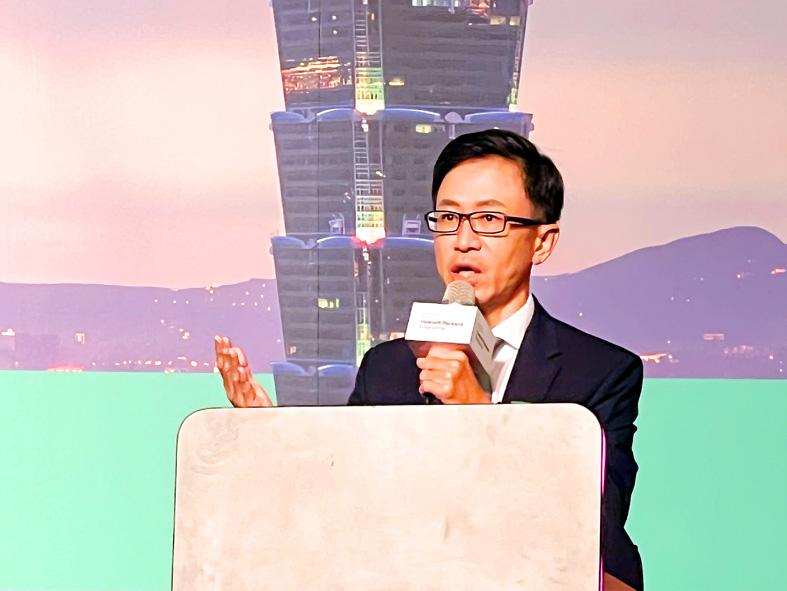Hewlett-Packard Enterprise Co (HPE) has laid out a plan to make Taiwan its global next-generation innovative technology and strategic supply-chain hub, focusing on technologies such as 5G applications, edge computing and high-performance computing.
At a news conference, HPE Taiwan managing director and president Jon Wang (王嘉昇) said the company would increase its investment and build the company’s presence in Taiwan to develop a wide range of next-generation technologies.
Wang did not provide specifics on the size of HPE’s investment in Taiwan, saying only that the company would spend millions of New Taiwan dollars to upgrade its research and development facility in Taiwan to bolster the development of its server and storage services.

Photo: CNA
Taiwan is well-positioned to be HPE’s technology hub, because, with the help of Taiwanese suppliers, it has become a center of procurement, planning, raw materials management and engineering for the company, Wang said.
At the same time, HPE’s global strategic procurement center has been led by its Taiwanese operations and the center plans to have local professionals work with other Taiwanese tech companies, he said.
HPE — which was spun off from PC giant Hewlett-Packard Co (HPE) in 2015 to focus on a portfolio covering data centers, cloud services, and workplace applications — has seen its workforce in Taiwan grow by about 30 percent in the past three years, Wang said, adding that the company is hiring to fill about 100 more vacancies.
With Taiwan’s tech-driven economy, rich supplier ecosystem and large high-tech talent pool, HPE has steadily boosted investment in Taiwan over the past 50 years, he said.

MULTIFACETED: A task force has analyzed possible scenarios and created responses to assist domestic industries in dealing with US tariffs, the economics minister said The Executive Yuan is tomorrow to announce countermeasures to US President Donald Trump’s planned reciprocal tariffs, although the details of the plan would not be made public until Monday next week, Minister of Economic Affairs J.W. Kuo (郭智輝) said yesterday. The Cabinet established an economic and trade task force in November last year to deal with US trade and tariff related issues, Kuo told reporters outside the legislature in Taipei. The task force has been analyzing and evaluating all kinds of scenarios to identify suitable responses and determine how best to assist domestic industries in managing the effects of Trump’s tariffs, he

TIGHT-LIPPED: UMC said it had no merger plans at the moment, after Nikkei Asia reported that the firm and GlobalFoundries were considering restarting merger talks United Microelectronics Corp (UMC, 聯電), the world’s No. 4 contract chipmaker, yesterday launched a new US$5 billion 12-inch chip factory in Singapore as part of its latest effort to diversify its manufacturing footprint amid growing geopolitical risks. The new factory, adjacent to UMC’s existing Singapore fab in the Pasir Res Wafer Fab Park, is scheduled to enter volume production next year, utilizing mature 22-nanometer and 28-nanometer process technologies, UMC said in a statement. The company plans to invest US$5 billion during the first phase of the new fab, which would have an installed capacity of 30,000 12-inch wafers per month, it said. The

Taiwan’s official purchasing managers’ index (PMI) last month rose 0.2 percentage points to 54.2, in a second consecutive month of expansion, thanks to front-loading demand intended to avoid potential US tariff hikes, the Chung-Hua Institution for Economic Research (CIER, 中華經濟研究院) said yesterday. While short-term demand appeared robust, uncertainties rose due to US President Donald Trump’s unpredictable trade policy, CIER president Lien Hsien-ming (連賢明) told a news conference in Taipei. Taiwan’s economy this year would be characterized by high-level fluctuations and the volatility would be wilder than most expect, Lien said Demand for electronics, particularly semiconductors, continues to benefit from US technology giants’ effort

‘SWASTICAR’: Tesla CEO Elon Musk’s close association with Donald Trump has prompted opponents to brand him a ‘Nazi’ and resulted in a dramatic drop in sales Demonstrators descended on Tesla Inc dealerships across the US, and in Europe and Canada on Saturday to protest company chief Elon Musk, who has amassed extraordinary power as a top adviser to US President Donald Trump. Waving signs with messages such as “Musk is stealing our money” and “Reclaim our country,” the protests largely took place peacefully following fiery episodes of vandalism on Tesla vehicles, dealerships and other facilities in recent weeks that US officials have denounced as terrorism. Hundreds rallied on Saturday outside the Tesla dealership in Manhattan. Some blasted Musk, the world’s richest man, while others demanded the shuttering of his